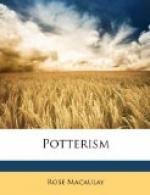What one specially resented was the way the men who had been killed, poor devils, were exploited by the makers of speeches and the writers of articles. First, they’d perhaps be called ‘the fallen,’ instead of ’the killed’ (it’s a queer thing how ‘fallen,’ in the masculine means killed in the war, and the feminine given over to a particular kind of vice), and then the audience, or the readers, would be told that they died for democracy, or a cleaner world, when very likely many of them hated the first and never gave an hour’s thought to the second. I could imagine their indignant presences in the Albert Hall at Gray’s big League of Nations meeting in May, listening to Clynes’s reasons why they died. I can hear dear old Peter Clancy on why he died. ’Democracy? A cleaner world? No. Why? I suppose I died because I inadvertently got in the way of some flying missile; I know no other reason. And I suppose I was there to get in its way because it’s part of belonging to a nation to fight its battles when required—like paying its taxes or keeping its laws. Why go groping for far-fetched reason? Who wants democracy, any old way? And the world was good enough for me as it was, thank you. No, of course it isn’t clean, and never will be; but no war is going to make it cleaner. It’s not a way wars have. These talkers make me sick.’
If Clancy—the thousands of Clancys—could have been there, I think that is the sort of thing they would have been saying. Anyhow, personally, I certainly didn’t lose my foot for democracy or for a cleaner world. I lost it in helping to win the war—a quite necessary thing in the circumstances.
But every one seemed, during and after the war, to want to prove that the fighters thought in the particular way they thought themselves; they seemed to think it immeasurably strengthened their case. Heaven only knows why, when the fighting men were just the men who hadn’t time or leisure to think at all. They were, as the Potterites put it so truly, doing the job. The thinking, such as it was, was done by the people at home—the politicians, the clergy, the writers, the women, the men with ‘A’ certificates in Government offices; and precious poor thinking it was, too.
3
We all settled down to life and work again, as best we could. Johnny Potter went into a publisher’s office, and also got odd jobs of reviewing and journalism, besides writing war verse and poetry of passion (of which confusing if attractive subject, he really knew little). Juke was demobilised early too, commenced clergyman again, got a job as curate in a central London parish, and lived in rooms in a slummy street. He and I saw a good deal of each other.
One day in March, Juke and I were lunching together at the 1917 Club, when Johnny came in and joined us. He looked rather queer, and amused too. He didn’t tell us anything till we were having coffee. Then Juke or I said, ‘How’s Jane getting on in Paris? Not bored yet?’




